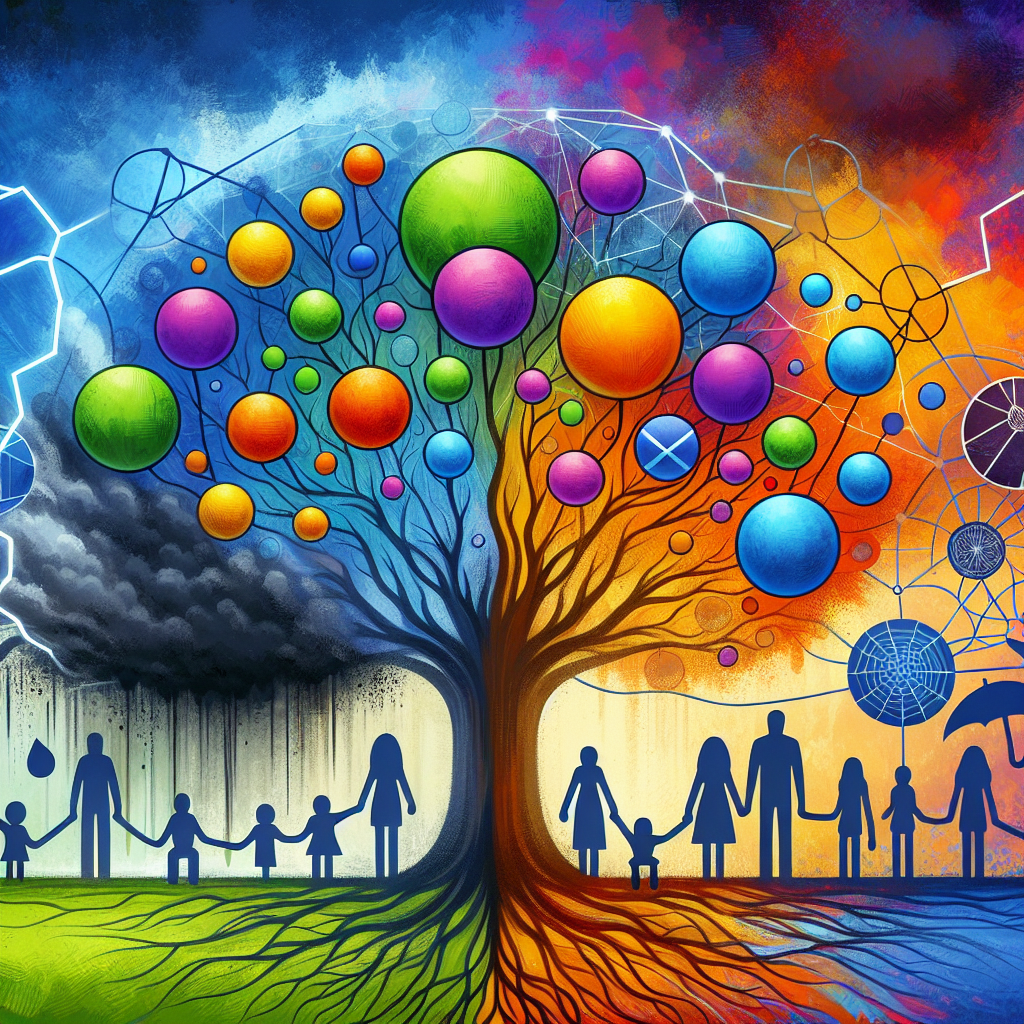-
Table of Contents

“Drug addiction shatters trust, strains bonds, and disrupts the harmony of family dynamics and relationships.”
Introduction
Drug addiction profoundly impacts family dynamics and relationships, often leading to a cascade of emotional, psychological, and financial challenges. The presence of addiction within a family can create an environment of instability and stress, as family members may struggle with feelings of betrayal, guilt, and helplessness. Communication breakdowns are common, as trust erodes and conflicts escalate. Financial strain can also arise due to the costs associated with substance abuse and potential loss of income. Children in these families may experience neglect or emotional trauma, which can have long-term developmental consequences. Overall, drug addiction disrupts the foundational bonds of family life, necessitating comprehensive support and intervention to restore healthy relationships and stability.
The Emotional Toll of Drug Addiction on Family Members
Drug addiction is a pervasive issue that extends far beyond the individual suffering from substance abuse. It infiltrates the very fabric of family dynamics and relationships, often leaving a trail of emotional devastation in its wake. The emotional toll of drug addiction on family members is profound, affecting their mental health, sense of stability, and overall well-being. Understanding this impact is crucial for fostering empathy and support within families and communities.
Initially, the discovery of a loved one’s addiction can be a shocking and disorienting experience. Family members may feel a whirlwind of emotions, including disbelief, anger, and sadness. This initial reaction often gives way to a prolonged period of emotional turmoil as they grapple with the reality of the situation. The constant worry about the addicted individual’s safety and future can lead to chronic stress and anxiety. Parents, siblings, and spouses may find themselves in a state of hyper-vigilance, always on edge, fearing the worst.
As the addiction progresses, it can erode trust within the family unit. Addicted individuals may resort to deceitful behaviors, such as lying or stealing, to sustain their habit. This betrayal can create a chasm of mistrust that is difficult to bridge. Family members may feel a sense of betrayal and disappointment, leading to strained relationships and communication breakdowns. The once strong bonds of love and trust can become frayed, leaving family members feeling isolated and disconnected.
Moreover, the emotional toll of drug addiction often manifests in feelings of guilt and shame. Parents may blame themselves, questioning their parenting and wondering if they could have done something differently to prevent the addiction. Siblings might feel guilty for not recognizing the signs earlier or for not being able to help. This self-blame can be debilitating, leading to a cycle of negative emotions that further exacerbates the family’s distress.
In addition to these emotional challenges, drug addiction can also disrupt the family’s daily life and routines. The chaos and unpredictability associated with addiction can make it difficult for family members to maintain a sense of normalcy. Financial strain is another common consequence, as resources may be diverted to support the addicted individual’s habit or to cover the costs of treatment and legal issues. This financial burden can add another layer of stress, compounding the emotional toll on the family.
Despite these challenges, it is important to recognize that families can also be a source of strength and resilience. The journey through addiction and recovery is arduous, but it can also bring families closer together. By seeking support from counseling, support groups, and community resources, families can learn to navigate the complexities of addiction and rebuild their relationships. Open communication, empathy, and a willingness to forgive are essential components in this healing process.
In conclusion, the emotional toll of drug addiction on family members is multifaceted and deeply impactful. It can strain relationships, erode trust, and lead to feelings of guilt and shame. However, by acknowledging these challenges and seeking support, families can find a path to healing and recovery. The journey may be difficult, but with resilience and compassion, families can emerge stronger and more united, ready to face the future together.
Strategies for Families to Cope with a Loved One’s Drug Addiction
When a loved one struggles with drug addiction, the ripple effects can profoundly impact family dynamics and relationships. The emotional toll, financial strain, and social stigma can create an environment of stress and uncertainty. However, families can adopt strategies to cope with these challenges, fostering resilience and hope in the face of adversity.
First and foremost, education is crucial. Understanding the nature of addiction as a chronic disease rather than a moral failing can shift perspectives and reduce blame. This knowledge empowers families to approach the situation with empathy and compassion, rather than judgment and anger. By learning about the physiological and psychological aspects of addiction, family members can better comprehend the behaviors and challenges their loved one faces.
Communication is another vital strategy. Open, honest, and non-confrontational dialogue can help maintain connections and provide a support system for the individual struggling with addiction. It is essential to express concerns and feelings without resorting to accusations or ultimatums. Active listening, where family members genuinely hear and validate each other’s experiences, can foster a sense of unity and understanding. This approach can also help in setting healthy boundaries, which are necessary to protect the well-being of all family members.
Seeking professional help is often indispensable. Therapists, counselors, and support groups can offer guidance and coping mechanisms tailored to the unique needs of each family. Family therapy, in particular, can address underlying issues and improve communication patterns. Support groups, such as Al-Anon or Nar-Anon, provide a community of individuals who share similar experiences, offering mutual support and practical advice. These resources can alleviate feelings of isolation and provide a sense of belonging.
Moreover, self-care is paramount for family members. The stress of dealing with a loved one’s addiction can lead to burnout, anxiety, and depression. Engaging in activities that promote physical, emotional, and mental well-being is essential. This might include exercise, hobbies, meditation, or simply taking time to relax and recharge. By prioritizing their own health, family members can better support their loved one and maintain their own resilience.
Setting realistic expectations is also important. Recovery from addiction is often a long and non-linear process, marked by setbacks and relapses. Understanding that progress may be slow and that relapses are part of the journey can help manage disappointment and frustration. Celebrating small victories and maintaining hope can sustain motivation and encourage perseverance.
Additionally, fostering a supportive home environment can make a significant difference. Creating a space that is free from judgment and filled with encouragement can help the individual feel valued and understood. This supportive atmosphere can enhance their motivation to seek and maintain recovery. Encouraging healthy routines, such as regular meals, exercise, and sleep, can also contribute to overall well-being and stability.
Lastly, it is essential to recognize that each family’s journey is unique. What works for one family may not work for another, and it is important to remain flexible and open to different approaches. Patience, persistence, and a willingness to adapt are key components in navigating the complexities of addiction.
In conclusion, while drug addiction can severely impact family dynamics and relationships, adopting strategies such as education, communication, professional help, self-care, realistic expectations, and a supportive environment can help families cope. By fostering understanding, resilience, and hope, families can navigate the challenges of addiction and emerge stronger together.
Q&A
1. Drug addiction often leads to increased conflict and tension within families, as trust is eroded and communication breaks down due to the addict’s behavior and the stress it causes.
2. Financial strain is a common impact of drug addiction on families, as resources may be diverted to support the addiction, leading to economic hardship and further stress on family relationships.
Conclusion
Drug addiction profoundly disrupts family dynamics and relationships by fostering an environment of mistrust, emotional instability, and financial strain. It often leads to increased conflict, breakdowns in communication, and emotional distress among family members. The addict’s behavior can create a cycle of codependency, enabling, and resentment, which further deteriorates familial bonds. Children in such families may experience neglect, trauma, and developmental issues, while partners and parents may suffer from anxiety, depression, and a sense of helplessness. Overall, drug addiction erodes the foundation of family unity, leading to long-term psychological and social consequences for all involved.



